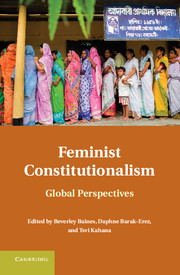Book contents
- Frontmatter
- Contents
- Foreword
- Contributors
- Introduction
- Part I Feminism as a Challenge to Constitutional Theory
- Part II Feminism and Judging
- 4 Her-meneutics
- 5 Intuition and Feminist Constitutionalism
- 6 Women Judges, “Maiden Speeches,” and the High Court of Australia
- 7 Will “Watertight Compartments” Sink Women's Charter Rights? The Need for a New Theoretical Approach to Women's Multiple Rights Claims under the Canadian Charter of Rights and Freedoms
- 8 Constitutional Adjudication and Substantive Gender Equality in Hong Kong
- Part III Feminism, Democracy, and Political Participation
- Part IV The Constitutionalism of Reproductive Rights
- Part V Women's Rights, Multiculturalism, and Diversity
- Part VI Women between Secularism and Religion
- Index
- References
5 - Intuition and Feminist Constitutionalism
Published online by Cambridge University Press: 05 June 2012
- Frontmatter
- Contents
- Foreword
- Contributors
- Introduction
- Part I Feminism as a Challenge to Constitutional Theory
- Part II Feminism and Judging
- 4 Her-meneutics
- 5 Intuition and Feminist Constitutionalism
- 6 Women Judges, “Maiden Speeches,” and the High Court of Australia
- 7 Will “Watertight Compartments” Sink Women's Charter Rights? The Need for a New Theoretical Approach to Women's Multiple Rights Claims under the Canadian Charter of Rights and Freedoms
- 8 Constitutional Adjudication and Substantive Gender Equality in Hong Kong
- Part III Feminism, Democracy, and Political Participation
- Part IV The Constitutionalism of Reproductive Rights
- Part V Women's Rights, Multiculturalism, and Diversity
- Part VI Women between Secularism and Religion
- Index
- References
Summary
In any constitutional system, we must ask, as a foundational inquiry, when and why a government may distinguish between groups of constituents for purposes of allocating benefits or imposing penalties. For feminists and others with a stake in challenging inequalities, the rationales that a society deems acceptable for justifying these classifications are centrally important. Heightened scrutiny jurisprudence for sex-based and other distinctions may help capture some of the rationales that rest on stereotypes and outmoded biases. However, at the end of the day, whatever level of scrutiny is applied, the critical question at any level of review is whether, according to the decision maker, the government has adequately justified the distinction it has drawn.
For most official classifications, the rationales for differentiating among people are obvious and unremarkable, and the laws at issue provoke no challenges. Age-based rules that require only some people (youth) to attend school are a classic example. Similar are rules that restrict the issuance of drivers’ licenses to individuals without significantly impaired vision. In these instances, the government's line-drawing is linked to a demonstrable characteristic of the people who are burdened by the measure at issue.
- Type
- Chapter
- Information
- Feminist ConstitutionalismGlobal Perspectives, pp. 98 - 112Publisher: Cambridge University PressPrint publication year: 2012



